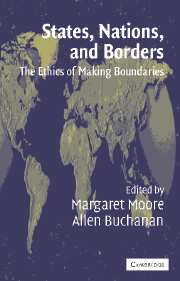Book contents
- Frontmatter
- Contents
- About the Contributors
- Acknowledgments
- 1 Introduction: The Making and Unmaking of Boundaries
- THE JEWISH TRADITION
- 2 Making and Unmaking the Boundaries of Holy Land
- 3 Man-Made Boundaries and Man-Made Holiness in the Jewish Tradition
- THE CONFUCIAN TRADITION
- THE CHRISTIAN TRADITION
- THE NATURAL LAW TRADITION
- THE ISLAMIC TRADITION
- THE LIBERAL TRADITION
- THE INTERNATIONAL LAW TRADITION
- CONCLUSION
- Index
2 - Making and Unmaking the Boundaries of Holy Land
Published online by Cambridge University Press: 24 November 2009
- Frontmatter
- Contents
- About the Contributors
- Acknowledgments
- 1 Introduction: The Making and Unmaking of Boundaries
- THE JEWISH TRADITION
- 2 Making and Unmaking the Boundaries of Holy Land
- 3 Man-Made Boundaries and Man-Made Holiness in the Jewish Tradition
- THE CONFUCIAN TRADITION
- THE CHRISTIAN TRADITION
- THE NATURAL LAW TRADITION
- THE ISLAMIC TRADITION
- THE LIBERAL TRADITION
- THE INTERNATIONAL LAW TRADITION
- CONCLUSION
- Index
Summary
“The Land of Israel is Holier than all other Lands”
(Mishnah Kelim 1:6)Introduction
What kind of a good is territory? How do we reason about land? The concept of territory has a unique role to play in the manner in which we think about land issues. Ordinarily we speak of territory as if it were analogous to a private individual's real estate holding. People sell and purchase territory and people inherit the land of their ancestors. Upon closer examination, however, the analogy breaks down. Consider the case of inheritance. Rules of inheritance guide the intergenerational movement of accumulated wealth. The point of transition between the generations is determinable, and the relevant agents can be individuated. The death of a parent occasions inheritance by a child. Territory does not move in the same way between generations. The line demarcating a generation is not the line between an individual parent and child. Generations are marked off in hindsight, and the process is closer to a process of periodization in history. In fact, territory does not “move” at all. The role of the concept “territory” is to transcend generational difference. Like the concept of a people or a nation, territory is transgenerational and connotes continuity over time. Territory is a political concept; it cannot be privatized.
Discussions of territorial boundaries usually relate to one of two sets of considerations. First, is a discussion of territory in terms of the geographical, topographical, or defensive integrity of a sovereign polity.
- Type
- Chapter
- Information
- States, Nations and BordersThe Ethics of Making Boundaries, pp. 19 - 40Publisher: Cambridge University PressPrint publication year: 2003
- 4
- Cited by



